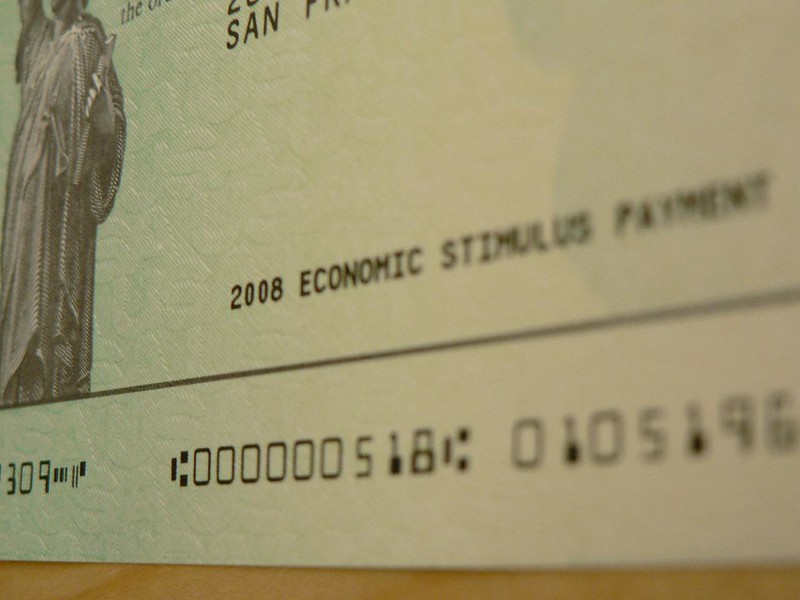Tax Stimulus Checks: What You Need to Know

Courtesy Christina B Castro, Flickr
A key feature of the recently enacted federal CARES Act is individual stimulus checks that the federal government will pay to help ease the financial burden the COVID-19 pandemic has caused. The CARES Act refers to these payments as a “Recovery Rebate for Individuals.”
Here are some answers to common questions about these new changes.
How much will I get paid?
The maximum payment amount is $1,200 for individuals or $2,400 for married couples plus an additional $500 per qualifying dependent child.
The IRS is basing the amount you will receive on your adjusted gross income, which can be found on line 8(b) of the 2019 1040 form and line 7 of the 2019 1040 form. Payments will be calculated as follows:
Tax Filing Status:
| Filer Type: | Income Threshold for Full Payment: | Income Threshold for Partial Payment: |
| Single (or Married Filing Separately) | $75,000 | Under $99,000 |
| Head of Household | $112,500 | Under $136,500 |
| Married Filing Jointly | $150,000 | Under $198,000 |
If your income is higher than the threshold for full payment, you will see a reduction of your payment at a rate of $5 for every $100 over the threshold you are. There is no minimum income required to receive a stimulus check and you do not need to have filed your taxes to receive your check.
When will I get paid?
The IRS will begin direct deposits in mid-April and will send the first payments to:
- those who have filed tax returns in 2018 and 2019 and whose bank information is already on record with the IRS, and
- those receiving Social Security income.
Those receiving Social Security income will have their payment direct deposited and do not need to take any steps to receive their check.
If you do not have direct deposit information on record with the IRS, you will receive a paper check in the mail. Although paper check distribution will reportedly begin in April, it may take until September for the IRS to mail all paper checks.
Priority for paper check distribution will be given to those with lower incomes.
How can I get paid faster?
TurboTax has partnered with the IRS to set up a stimulus registration page where those who do not have their direct deposit information or mailing address on record with the IRS can provide that information to receive their stimulus payment sooner.
The IRS reports that they will also develop a website in the coming weeks to allow those who have not previously provided their bank details to do so.
How will the stimulus payment affect my taxes?
The stimulus payment is an advanced tax credit that will offset your 2020 federal income taxes. What this means is that instead of giving a refundable tax credit that you will receive in 2021 when you file your 2020 taxes, the government is giving the tax credit now in the form of cash payments. Since your 2020 total income – and the taxes that you owe – are not yet known, the IRS will calculate the payments based on your 2018 or 2019 tax return.
Because this is a tax credit, you will get the payment (assuming your income qualifies) even if you don’t owe taxes or make enough to have to file taxes for 2020. You will have to claim the tax credit on your 2020 tax return, but it will basically cancel itself out and have no overall impact on your tax return unless you were underpaid.
Here are a few scenarios:
- If your income for 2018 or 2019 was more than the income threshold, you will receive less than the full stimulus amount.
- If you end up making less money in 2020 than you did in either 2018 or 2019, you are entitled to apply the underpayment to your 2020 taxes and receive the underpaid amount as a tax credit.
- If you end up making more money in 2020 than you did in 2018 or 2019 and were supposed to have received a lower payment, there is good news: you do not have to pay back the difference.
Final thoughts
The IRS urges anyone with a tax filing obligation who has not yet filed a tax return for 2018 or 2019 to file as soon as they can to receive an economic impact payment. Taxpayers should include direct deposit banking information on their returns.
As always, beware of fraudulent attempts to obtain your personal information. The Federal Trade Commission has already fielded dozens of complaints about fraudulent stimulus check schemes. Be wary of any requests for your personal or financial information, offers for advances on the stimulus check, or offers to help apply for the program. For more information on how to avoid these scams, click here.
Laura McGarry is an attorney at Russell, Krafft and Gruber, LLP in Lancaster, Pennsylvania. She received her law degree from Penn State Law and provides legal counsel to individuals and businesses in Lancaster and surrounding communities.
